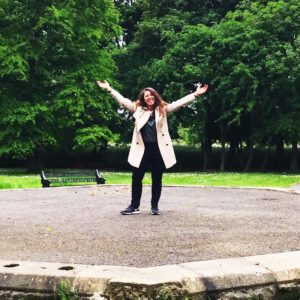 A few days ago, I got on a train to London to visit Winter Wonderland with some friends. It was a day full of fun, laughs, chocolates, carbs, and, most importantly, roller coaster rides. As a kid, I used to be afraid of them, but that day, for some inexplicable reasons, I felt brave enough and went for it. I must admit, I underestimated the force of twisting tracks, loops and turns, which made the experience scary, thrilling, and exciting – all at once. It was a ride full of fast moments followed by short pauses upon the hills and quick descendants toward the ground. Nevertheless, I was getting increasingly (and surprisingly) confident at every sharp turn; it was then that I thought how that ride had an uncanny similarity to the experiences characterising my PhD in 2019. Indeed, although a part of me is still feeling for those challenging moments when I was struggling, the other one recognises the growth over it, which is what I want to focus on as I am getting ready to get onto my 2020 PhD roller coaster ride. Just to be clear, I am not expecting fewer twists, loops or turns; this time, though, I may be able to cope with it better by reminding myself about some lessons learnt.
A few days ago, I got on a train to London to visit Winter Wonderland with some friends. It was a day full of fun, laughs, chocolates, carbs, and, most importantly, roller coaster rides. As a kid, I used to be afraid of them, but that day, for some inexplicable reasons, I felt brave enough and went for it. I must admit, I underestimated the force of twisting tracks, loops and turns, which made the experience scary, thrilling, and exciting – all at once. It was a ride full of fast moments followed by short pauses upon the hills and quick descendants toward the ground. Nevertheless, I was getting increasingly (and surprisingly) confident at every sharp turn; it was then that I thought how that ride had an uncanny similarity to the experiences characterising my PhD in 2019. Indeed, although a part of me is still feeling for those challenging moments when I was struggling, the other one recognises the growth over it, which is what I want to focus on as I am getting ready to get onto my 2020 PhD roller coaster ride. Just to be clear, I am not expecting fewer twists, loops or turns; this time, though, I may be able to cope with it better by reminding myself about some lessons learnt.
Quality over quantity
We are all tempted by comparing our results with whoever is sitting next to our desk. I have done that quite a lot and made myself feel miserable, self-inflicting the vicious circle of negative thoughts that invited the unwelcome guest called anxiety into my life [1]. Why am I doing it? If I think this through, there is no point. Everyone is different and is doing different things differently. It is like trying to compare potatoes with peas assuming that quantum and relativity physics laws follow the same rules. That just cannot happen, as poignantly argued by Stephen Hawkins. From now on, I will focus on my work aiming for QUALITY OVER QUANTITY.
Gaining control
The real world is viscerally unpredictable, and as much as I dream of becoming a Marvel superhero, uncertainty reigns supreme over my every-day decisions. During 2019, I experienced the debilitating feeling of being paralysed by reluctance in decision-making. I learned the hard way that perhaps accepting the lack of control over reality can help me to gain more control of it. How? Not controlling the situation, but CONTROLLING MY REACTION TO IT. Sounds cliched but the approach does work.
Managing time for myself
In the last few years, I have spent so much time planning every single day of the week that I ended up developing impressive time management skills. Nevertheless, I surprisingly discovered how I have not been good at managing time for myself. In 2019, during what I recognise as my lowest point, I realised that my life has a lot more to offer than just my PhD, and although I am still learning on how to deal with Grad School Guilt syndrome, I can see tangible improvements in my decision-making process. This year around, I will be kind to myself; MY TIME OFF will be fulfilled with activities that nurture myself, and not necessarily with something that feeds my PhD.
 Decisions are inevitably
Decisions are inevitably
I wish someone could write me a prescription of decisions. I am the master of overthinking, but then, who is not? I mean, if you are a researcher, regardless of the stage you are in your career, you are trained to evaluate each situation, identify possible risks and plan a response to those in case they arise. I think this attitude has often led me to waste time. Although a critical approach to inquiry is paramount in research, acknowledging that a plethora of confounding factors could act affecting my predicted results, I have decided that I will FOCUS more ON WHAT NEXT. Indeed, it is from what happens after taking a decision, bad or good, that I draw my learnings from.
Living through my emotions
Emotional processing is a complicated topic to discuss. Many writers, philosophers and scientists have built their entire career debating about their beliefs on the role played by emotions in the lives of humans. Oftentimes, many of them have discredited those promoting reason instead. I describe myself as a very emotional and sensitive person. As a matter of fact, I cried watching the latest version of The Lion King, which says a lot about me. It takes a lot of effort for me to detach my emotions from my thoughts with all the ramifications you may think of. For a long time, I thought there was something wrong with me until I started socialising this aspect of mine with other people who have been through it as well. I am still learning, but I have already experienced how TAKING SOME TIME TO GO THROUGH MY EMOTIONS makes me feel better and help me to close the Pandora vase quickly avoiding wasting precious energies.
Seeking a happy ending
Initially, I thought that achieving my short- and/or long-term goals was the key to be a happy PhD student. Experience has taught me that perhaps I needed to revisit my approach vis-à-vis happy ending. In any situation, regardless of the outcome (success or failure), there is an ending, and it is down to me writing it. It is challenging trying to end any situation happily. Still, I am becoming more aware of how to see through things by valuing the quality of my work over quantity, responding to a situation proactively by taking control of myself, allowing myself to spend time off how I want, making decisions and learning from the consequences, and accepting myself as a human being redolent with a wide range of emotions which makes me feel the thrill of the roller coaster as well as the fear of it. I guess all of this will help me script my own HAPPY ENDING.
Clearly, 2019 has taught me a lot more than what has been discussed in this blog. In the last 365 days, I lived different experiences, some of which are too intense to be elucidated in words, but tied strong enough to emotions that have left an indelible impression in my mind. I hope this reflective piece can help some fellows to start the new year on a positive note; never losing sight of the fact that undertaking a PhD is an excellent opportunity to grow not only professionally, but also personally. Take advantage of it, and do not forget to write your happy ending!
Author
Ester Bellavia [2]is a Alzheimer’s Society funded, PhD candidate at Newcastle University [3]. Currently conducting a research aiming to explore the role of Patient and Public Involvement in dementia research and explain how best to involve people living with dementia and family carers. A basketball player and fan, originally from Italy with a background in nursing both overseas and within the NHS, where she also completed an NIHR funded MA in Research Methods at the University of Nottingham.